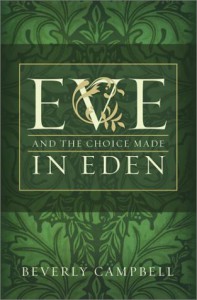Eve and the Choice Made in Eden

This book was definitely groundbreaking in its time. It is the preeminent work on Eve and it basically dissects each scripture about her. It depends heavily on Restoration scriptures and modern revelation (backing up almost everything with at least three quotes). It posits that the choice made in Eden was a well-thought-out, premeditated decision and that it was definitely not an accident. It honors Eve for choosing the harder path.
It does have a few things that sort of bothered me (reading it years later) like sections that talk about how all women should be mothers/in the home and that is their highest calling. It focuses on how women think differently than men (more emotionally and more self-sacrificing) and how women will need to step up in the last days to defend the priesthood and God's way of doing things. Also, there is very little mention of Heavenly Mother (a page or two in the whole thing) and several ironies seem to be missed (Adam = man and woman, but God is only HE, etc.).
"...it is not enough to honor wives, mothers, and daughters. We must value and honor women..." (p. 4)
The book's premise is that understanding Eve's story is key to fixing our problems with how we treat women. "[The prophets have spoken about Eve]...to dispel misconceptions concerning Eve and her role, for reasons essential to the wholeness of our very souls." (5)
The book also attempts to help answer roughly 20 questions including Was there another way?, Did Eve/woman help in the creation?, Was it an ambiguous commandment or higher law? How do you reconcile a conflicting commandment?, Adam's rib?, the meanings of "transgression" and "beguiled", Why was Satan allowed in Eden?, the curse of childbirth and farming?, and more.
Bruce R. Mckonkie says that Eve, Sarah, Mary and other women were in the noble and great ones group that created the earth. (is this opinion or doctrine?)
J. Reuben Clark equates motherhood (create bodies) with priesthood
"Mother of All Living" was a title and a stewardship!
helpmeet = a power or strength equal to (above the animals), not lesser help
This was the original plan--not an unforeseen event (Eve choosing this and the Fall). "The Lord knew they would do this and he had designed that they should..." (B Young)
"It was necessary that Adam and Eve and their posterity become subject to sin, that thereby we all might be privileged to work out our own salvation" (?)
"Her act, whatever its nature, was formally a transgression but eternally a glorious necessity..." (Dallin H. Oaks)--whatever its nature? And formally a transgression? This seems to me that Oaks thinks it was a sin, but Campbell later redefines transgression and says it was not.....?
Transgression vs. Sin:
Transgression is not inherently wrong, but it has consequences and is something that is legally (or as a parent would) prohibited. Campbell quotes Packer, Oaks, and J. Smith for this, but they all define it slightly differently. I like all of it, but they don't come together so I'm not sure this is doctrinal.
"The fall is the beginning of the rise of man"--BH Roberts
"Discernment= the ability to see beyond the literal to the divine essential" (Campbell)
She argues that the fruit was only forbidden is they wanted to stay in the Garden. It was a condition of the place--not a sin to partake, just a decision that had major consequences.
She mentions Mitochondrial Eve and the 7 Daughters of Eve book.
The Rib:
symbolic of the bosom friends (Hugh Nibley)--"keeper of the tsela" in Jeremiah 20:10
Hugh Nibley also says that when they got married in Eden they were given robes of glory.
We don't know how long they were in Eden, but Nibley suggests that by the time they were tempted, they had learned and felt enough to know they would have to partake to progress.
Campbell proves that the Lord taught them the necessity of the Fall (before it happened) and that Satan was simply a catalyst for it--he thought he was ruining the plan, but he was simply moving it forward.
Beguiled: "indicates an intense multilevel experience which evokes great emotional psychological or spiritual trauma"--Eve was beguiled, not tricked. Eve says she "saw" (or knew) the tree was good, pleasant, etc. It wasn't a simple sensory thing, she knew it was good for them and good for mankind.
Satan forces Eve to re-evaluate and decide it's time to move on.
Eve and the Savior both brought life to mankind by their death (and Gardens!)
"lest ye die" was more of a consequence than a punishment (BH Roberts)
God instructed Adam and Eve after the Fall. He didn't just throw them out--he tells them about their newly mortal bodies and pain and etc. "sorrow" = toil, sweat, labor; "multiple" = repeat over and over, not increase! The curses are instructions for our mortal bodies. Campbell says the earth is cursed, but possible the earth is receiving instructions as well.
Campbell doesn't address the "preside" problem--she supports presiding in righteousness as the church defines it. She says you only follow their righteous leadership.
Satan had to be there for it to be opposition. Satan is always there at the key points of the plan--full evil to full good = opposition. So we can make a fully informed choice. This means that Eve knew what she was doing. She knew the good vs. the bad!
"The Garden story brings into clearer focus the choice we face...decide to forego static security and embrace all risks of an earthly physical body...including the appalling risk of permanent spiritual death...to fulfill potential to become like Heavenly Father." (166) get the full quote!
All in all, I think this should be standard feminist reading (and reading on the Fall). I'm excited to read her next one--Eve and the Mortal Journey. However, it needs to be talked about more--especially by the brethren.


